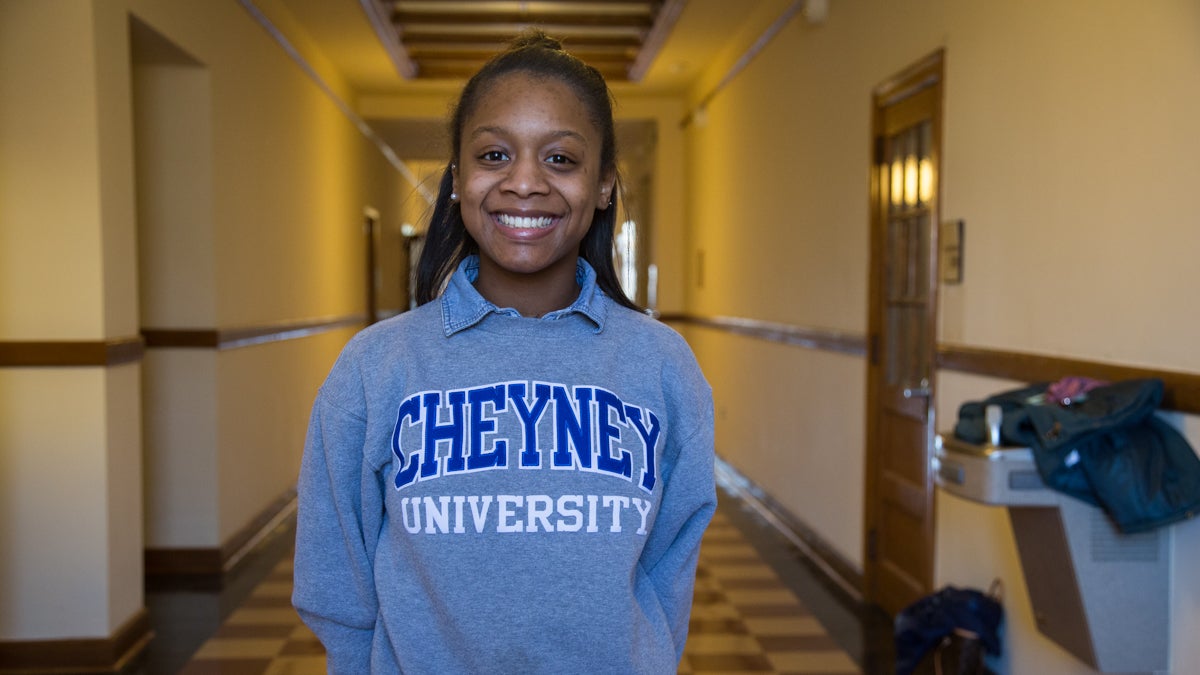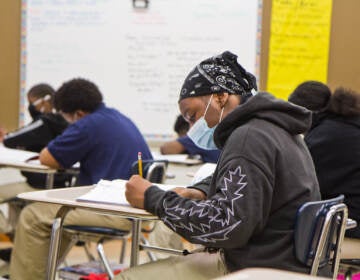Changes coming to 180-year-old Cheyney, though what form they’ll take still unclear
Listen
Sharell Reddin is the president of the Student Government Association. Cheyney University celebrates its 180th anniversary under a cloud of uncertainty as the state system does a strategic review of the HBCU and other colleges, which could include merging or even closing the university. (Emily Cohen for NewsWorks)
Cheyney, the country’s oldest historically black college or university or HBCU, celebrated its 180th birthday this year — following a few tough years.
The HBCU has struggled with its lowest enrollment and highest financial debt in the school’s history.
And a state-appointed task force recently recommended a new institutional model for Cheyney University.
Separately, the Pennsylvania State System of Higher Education is also conducting a strategic review of the system’s 14 universities. The initial recommendations from that review are due July 12; they could still call for mergers or closures, particularly for Mansfield, Clarion, Cheyney and other smaller, struggling schools.
Cheyney took out a line of credit for more than $30 million from the state system, and it may still have to repay $29 million to the U.S. Department of Education for mismanaging student financial aid. While enrollment is improving, it’s half of what it once was.
The university, which was placed on accreditation probation in 2015, has to prove to accrediting body Middle States Commission on Higher Education by Sept. 1 why it should not lose its accreditation.
‘On the cusp of something’
The school should modernize outdated curricula, but it has much to offer, said Sharell Reddin, student government president and Keystone Honors Academy scholar.
“When I came here my freshman year, I was in total shock,” she said. “I was like, ‘What am I going to do? I was just so, so lost. I was like, ‘Why did I make the decision?’ But I can honestly say after going here and after being more involved in campus and being in Keystone and being on government and just joining different organizations and clubs on campus … Cheyney gives any and everyone an opportunity to come and to thrive and receive an education.”
The 21-year-old from Newark, New Jersey, said students worry about Cheyney’s future but that fear and speculation have increased student pride on campus.
“With all of the information that’s coming out, we are definitely standing strong as a university because we don’t want to see us having to merge or having to shut down at the end of the day,” Reddin said. “It’s the first historically black institution in the nation. It has paved the way for the Howards, for the Hamptons, for the Lincolns, for the anything.”
Rising junior Meghan Sowersby said having people reviewing the state system on campus hasn’t been easy.
“It does cause a little bit of anxiety, especially when you see people walking around with clipboards and strangers on campus, kind of evaluating. You don’t know why they’re here,” the Keystone Honors Academy scholar said. “But it also shows that we’re on the cusp of something, and that change is coming. So I think that’s a reassurance for all students that are here.”
The task force recommendations include creating the Institute for the Contemporary African-American Experience; scaling majors down from 17 to 12; eliminating its NCAA Division II athletic programs; and conducting a feasibility study on selling or leasing part of Cheyney’s 275 acres.
The last recommendation has touched upon the persistent rumors that West Chester University — six miles away — is taking over Cheyney’s campus or merging with Cheyney.
Cheyney’s national alumni association president, Alfonso Coleman Jr., said rumors about West Chester taking over have circulated since he set foot on campus in 1968.
“From that point on, all I heard was that West Chester wanted the land,” he said. “It did not happen then, but it’s something that has been a constant. Recently, I found out that this was something that was talked about back in the ’40s, in the ’30s.
“And so it’s a constant thing that the sky is falling, that West Chester is going to take over, that the state is going to do this. It has to stop somewhere.”
Marybeth Gasman, University of Pennsylvania professor and and an expert on HBCUs, said change is necessary.
“You have to focus on what you’re really good at and let everything else go,” she said. “You can keep the ethos of like the historical spirit of the institution. That’s really, really important and powerful. But you might not be able to be exactly the same thing because times have changed and a lot of institutions have had to change.”
Many definitions of success
Information systems librarian B.J. Mullaney is president of the Cheyney chapter of APSCUF, the union for faculty, staff and coaches.
She said people need to broaden the concept of success.
“What cost do you put on human life and human aspiration? And is there a reason? Because the impact is not just a single individual when someone from a family who is first generation goes to college.
“And it’s not just their family,” Mullaney said. “It’s other people that they touch, not only in their job, in their community and ultimately in this commonwealth.”
Sowersby, 20, said she understands why the school isn’t seen as a successful investment, but she wants skeptics to pause for a moment.
“I’m from Pennsylvania, intend to give back to Pennsylvania because of what Cheyney’s invested in me, so your money isn’t going to nothing,” she said. “I think you just need to — and this is you, the taxpayer, you the politician or the administrator — just need to hold out and put a little bit more time and effort into this investment and see where it goes.”
Ivan Turnipseed, associate professor and chair of hospitality and recreation management, said he hopes the review won’t just consider the bottom line.
“You know why you can’t just look at things at the bottom line?” he said. “Because I’m an African-American male, right. There was a time in this country where we all worked for free. I’m sure that did wonders for the bottom line.
“That’s not a good thing to do. You can’t just say, ‘Well it just makes better sense if we have them work for free.’ So you see how it just doesn’t work on its own.”
Turnipseed, who said his program has grown 50 percent in the last five years, said program graduates have a 100 percent job-placement rate.
The hospitality and Keystone Honors programs are successful because they’re funded properly, he said, and the programs that aren’t working are not.
During Cheyney’s bleakest times, the campus felt and looked separate but unequal, he said.
“The grass was like over a foot high, and people started putting out that we’re being an environmental campus. No we weren’t. We just can’t afford to cut the grass.
“And then when they would finally cut, it looked like we were selling hay. It was just laid out there,” he said. “I had donors walking through like foot-high grass. I mean, it’s just insanity and ridiculousness all at the same time.”
Now that the grass is cut regularly, he said, it’s those little things that transform a place.
Transformation
It’s the responsibility of society to make sure all state-owned schools are equal, Turnipseed said.
“What is the state doing? Why is the state school failing? What isn’t the state doing right for all these years?” he said.
State funding for Cheyney and other Pennsylvania public colleges once covered two-thirds of expenses while tuition supplied the rest. Today, tuition covers 75 percent.
Of the nearly dozen faculty, staff, alumni, students, state legislators and HBCU experts interviewed, all see the disparities between Cheyney and other state-owned schools as racially motivated.
State system administrators bristle at that, noting that on a per-student basis, Cheyney gets far more than, say, West Chester or Kutztown.
When it comes to financial inequity, librarian Mullaney said that’s nothing new for Cheyney. She pointed to 1920, when Cheyney’s president Leslie Pinckney Hill turned it from a private institution into a state normal school. That change increased its appropriation by more than 20 times — from $6,000 to $125,000 — but it still wasn’t enough.
“[Pinckney Hill] said, ‘We’ll need more because we want to be level. We want to have everything that all the other schools did,'” Mullaney said.
That’s a phrase Cheyney presidents are repeating nearly a century later.
Cheyney supporters argue equity is not the same as financial equality.
“I think the system has to say to itself, ‘What did we do to cause this problem at Cheyney? Have we done our part? Have we funded Cheyney properly or did we give them a real small piece of the pie when we divvied it up and make sure that West Chester and other universities got larger pieces of the pie?’
“And I think that’s where we are,” said Coleman, the alumni association president.
After rising 5 percent last year, Cheyney’s enrollment is projected to grow 25 percent this fall.
The university ranks first among Pennsylvania’s state-owned schools and second in the state overall in upward mobility rates, according to a recent New York Times report.
And Cheyney, like other HBCUs, has better graduation and retention rates for black students, particularly those who are the first in their family to go to college. Other institutions may want to use Cheyney and other HBCUs as a resource since the graduation rates of black students have actually declined at public universities in the last decade.
To help the freshman class become more engaged this past year, Cheyney created academic learning communities with the theme of transformation.
The faculty even created a rap, “Transformation,” based on Beyonce’s song, “Formation.” The first verse is:
Y’all haters corny with that ‘Cheyney gonna close’ mess.Paparazzi catch our fly and resilience.We’re so reckless when we rock our significance.We’re so possessive touting premier black tutelage.Our founder Richard Humphreys in 1837.We are the first. We are the best. Don’t you ever forget.
The theme is a fitting one for a university looking to evolve so it continues as the oldest HBCU in the nation.
WHYY is your source for fact-based, in-depth journalism and information. As a nonprofit organization, we rely on financial support from readers like you. Please give today.




